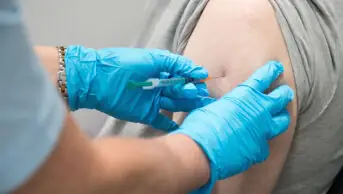
Shutterstock.com
An investigational antiviral, manufactured by Pfizer, may reduce the risk of hospitalisation or death in patients with COVID-19 by 89%, according to interim analysis results published on 5 November 2021.
The oral antiviral PF-07321322 (Paxlovid; Pfizer) is a SARS-CoV-2 protease inhibitor that has been specially designed to stop the virus from replicating.
In the trial, the antiviral was co-administered with a low dose of the antiretroviral drug ritonavir to help slow the speed at which it is broken down in the body, with the aim of making sure the antiviral remained active in the body long enough to help combat the virus.
The antiviral was tested as part of the Evaluation of Protease Inhibition for COVID-19 in High-Risk Patients (EPIC-HR) trial.
This is a phase II/III randomised controlled trial recruiting 2,100 non-hospitalised adult patients with COVID-19 who were at a high risk of progressing to severe illness. However, the manufacturer’s interim data is based on the results of 1,219 participants.
The trial showed an 89% reduction in the risk of COVID-19-related hospitalisation or death from any cause in patients who received PF-07321322/ritonavir within three days of developing symptoms, compared with those who received placebo.
Overall, 0.8% (3/389) of patients who received the drugs were hospitalised by day 28 compared with 7% (27/385) of patients who received the placebo.
Participants who received the drug within five days of developing symptoms also saw benefits, with 1.0% (6/607) of patients who received the antiviral hospitalised by day 28 compared with 6.7% (41/612) of patients who received a placebo.
There were no deaths reported in patients who received the antiviral compared with ten (1.6%) deaths in patients who received the placebo.
At a press conference at Downing Street on 20 October 2021, Javid announced that 250,000 doses of the antiviral had been ordered by the government, along with 480,000 doses of another antiviral, molnupiravir.
Molnupiravir became the first oral antiviral for the treatment of COVID-19 to be approved by the Medicines and Healthcare products Regulatory Agency (MHRA) on 4 November 2021, after as yet unpublished interim trial results, suggested that molnupiravir could reduce the risk of hospitalisation or death from COVID-19 by around 50%.
Sajid Javid, health and social care secretary, described the Pfizer results as “incredible” and confirmed that the MHRA would now carry out an assessment of the drug’s “safety, quality and effectiveness”.
“If approved, this could be another significant weapon in our armoury to fight the virus alongside our vaccines and other treatments, including molnupiravir, which the UK was the first country in the world to approve this week,” he said.
Albert Bourla, chairman and chief executive at Pfizer, said the “data suggest that our oral antiviral candidate, if approved or authorised by regulatory authorities, has the potential to save patients’ lives, reduce the severity of COVID-19 infections, and eliminate up to nine out of ten hospitalisations”.
Read more: Antivirals for COVID-19: five questions that must be answered


